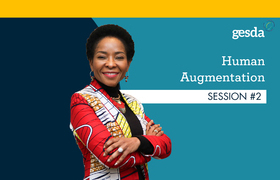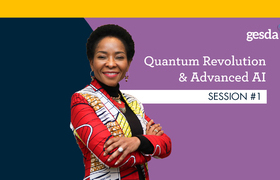UCT VC hosts webinar on human augmentation
20 July 2022 | Story Stephen Langtry. Photo Getty Images. Videography MS Teams. Video Edit Ruairi Abrahams. Read time 2 min.The four-part series themed “Using the science of the future to shape your present” was launched on Sunday, 10 July. During the second session held on 17 July, Vice-Chancellor Professor Mamokgethi Phakeng was joined by geneticist Professor Ambroise Wonkam and human rights activist Leo Igwe to discuss human augmentation.
Professor Phakeng was invited by Switzerland-based ‘think and do tank’ Geneva Science Diplomacy Accelerator (GESDA) to host a series of virtual engagements on “Using the science of the future to shape your present”. These sessions are aimed at bridging the understanding of how science might shape the future, and how these predicted futures can be used to shape the present while ensuring that decisions and discussions include voices of the African youth.
The second session posed the question, “Are we ready for genetic enhancement?” The topic of human augmentation was relevant because over the past century, public health interventions have nearly doubled the average lifespan. This welcome development has been compromised by commensurate rises in the incidence of cancer, Alzheimer’s and many other diseases of age. However, advances in genetic engineering, neurotechnology and drug development now look set to increase our healthspan too.
Staying human
Professor Wonkam, who is professor of Genetic Medicine at Johns Hopkins School of Medicine, elaborated on the medical benefits of genetic enhancements. He also pointed out that it was critical to include the youth in these conversations. It was also important that the subject should not be approached only from European and American perspectives since many of the challenges that could be addressed by emerging technologies affect Africa.
Igwe, who is a human rights advocate, reflected on the potential that emerging technologies have to eradicate major diseases. This will also have an impact on other social issues such as poverty and mortality rates. There are, however, major ethical questions which still have to be resolved.
Phakeng highlighted the need for governments, businesses and academia to work together to prepare us for the future promised by these medical advances. People are often scared of these developments because they see this as an attempt to “play God”.
 This work is licensed under a Creative Commons Attribution-NoDerivatives 4.0 International License.
This work is licensed under a Creative Commons Attribution-NoDerivatives 4.0 International License.
Please view the republishing articles page for more information.











